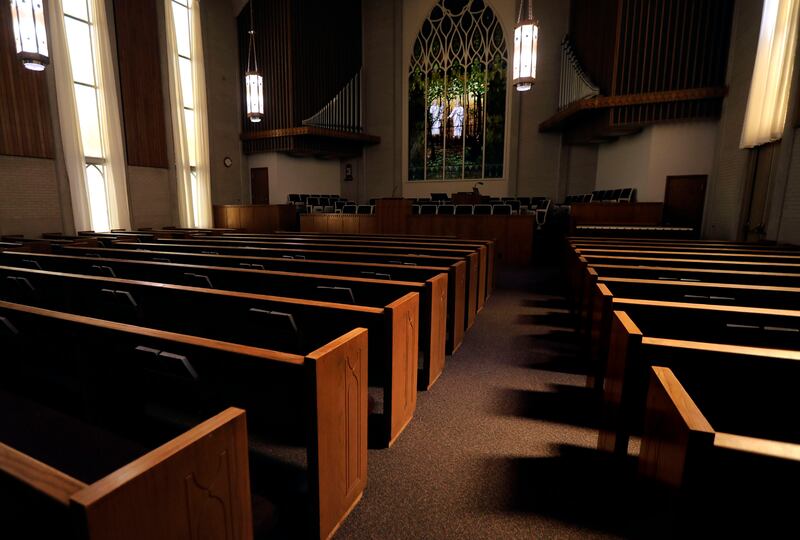The bias of pandemic restrictions wasn’t lost on religious Americans: Lawmakers didn’t seem to think twice about locking churches, mosques and synagogues while state liquor stores stayed busy and bike shops couldn’t keep up with demand.
Fortunately, things are looking up. Case counts are declining and worship services are tentatively expanding their in-person gatherings. But for Americans hoping for catharsis from the past year, faith will need to play more than second fiddle. Worshipping in true religion will be essential for healing.
Nearly one year ago, I sat at my kitchen table and wondered how we would find meaning in a global pandemic. Easter Sunday was less than a week away, and the promises of being able to celebrate like normal left with the rising death count. Life was anything but how I expected it to be.
The answer, as I wrote at the time, was for the Christian world to find meaning in and through the faith’s progenitor, a man of sorrow who was well acquainted with grief. More than any Easter I had experienced, last spring captured in personal ways the hope that can spring from a season of anguish. It seemed an allegory for the life of Jesus Christ.
That was at the beginning. This year’s spring feels more optimistic, as what seems to be the worst of the pandemic fades behind us. Still, to find closure from the bitterness of the past 12 months, the same question demands an answer from us today:
How will we make meaning of it all?
It won’t be easy. “Our crisis of isolation, division and cultural conflict is in many respects a crisis of meaning,” American Enterprise Institute scholar Yuval Levin writes for the Deseret News. Society’s institutions fulfill a specific purpose, he says, and religion’s role is to lift the souls of man and give meaning to this existence. But when religion declines, so does the meaning it lends society.
For evidence, review the past few months. Social strife, cancellation and aggression are manifestations of a society “without a traditional vocabulary of sin or redemption,” writes Levin. People are starved for a moral compass, and “the very forms of our conflicts over race, sexuality and the meaning of our history are an indication of such hunger.”
And the famine is spreading. Even among churchgoers, partisanship acquired a certain piety during the pandemic that overtook the divine charge to “be one.” My colleague Samuel Benson put a point on it: “Looking to politicians to save us from all of life’s problems — to view them as saviors — borders on idolatry.”
And soon we’ll be back under one roof.
Consider that for a moment. Chances are you’ll worship next to somebody who never wore a mask in public, and that person will sing alongside somebody who never left their house. You’ll see folks who plastered Facebook with memes of the “China Flu” and others who lost family members to the virus. Some will have marched with Black Lives Matter, others might have counterprotested.
Then what?
Each congregant will have suffered in their own way, yet each will need to heal to move forward. We won’t find meaning by pretending the past didn’t happen, nor can we find meaning by battling one another.
Perhaps there’s a third way: allowing our collective grief to move through us and finding meaning in its conclusion.
For years David Kessler and Elisabeth Kübler-Ross, the world’s foremost experts on grief, preached the five stages of the grieving process — denial, anger, bargaining, sadness and acceptance. Then, after losing his 21-year-old son, Kessler introduced a sixth stage two years ago: meaning. It suggests that seeing grief to its conclusion doesn’t end with accepting reality, but with a new light of understanding that shapes our world going forward.
In a faith setting, that requires a good deal of empathy — what columnist David Brooks calls “seeing each other deeply” — but isn’t that the gift of institutionalized religion?
At its best, worship allows the rare chance for classes and cultures to commingle in a shared purpose. Our churches are designed to place “the least of these” on the same level as society’s most visible. In that sense, true religion requires us to learn from and serve one another, even if that other person has offended us with their virtual rants.
Our choice is to either choose what religion asks of us or to supplant those demands with our private gospels.
“Will ye also go away?” Jesus asked his apostles after preaching a hard doctrine. Post-pandemic religious worship asks us the same question. Will we embrace each other in our weakness and move forward in unity, or will we turn inward in bitterness?
America’s best efforts at healing from the year’s tragedies will happen within our houses of worship if we allow the institutions to fulfill their purpose. Not backing down from those demands will mend our hearts and, with effort, heal a nation.


